12. oktober
Due diligence in forest risk commodities

Join this webinar to get an introduction to due diligence in the forest risk value chains and how this relates to compliance to the EU Deforestation Regulation.
In this webinar, we will dive into how companies can work in a structured way with due diligence in supply chains, among others by presenting several concrete tools. In addition, one of the members of the Danish alliances for responsible coffee, soya and palm oil will present their approach and concrete challenges in their supply chains.
During the webinar we aim to address these questions and provide practical guidance: To what extent do the different due diligence expectations overlap? In what aspects do they differ? How can companies and other actors best approach and integrate their work with due diligence in forest risk commodities?
Speakers:
• Elena Sosa del Cerro, Senior Manager, Preferred by Nature
• Sofie Tind Nielsen, Senior Forest Advisor, WWF Denmark
• Sarah Dieckmann, Advisor at Ethical Trade Denmark
• Carolien Millenaar, bæredygtighedsspecialist, DLG-koncernen
The webinar is open for everyone. Registration is closed – contact Jacob Lykke Andersen at ja@etiskhandel.dk for link and more information.
Background:
Every year, the world loses an area of forest equivalent to about twice the size of Denmark due to deforestation. At the same time, there is a historically large loss of biodiversity. We cannot turn a blind eye when our consumption leads to deforestation – both in Denmark and abroad.
The new EU Deforestation Regulation will try to address this by setting stricter requirements for trade at a global level. A law that will create completely new rules for trade. In the regulation, you must be able to document a geolocation of the origin of the product. This will be a major challenge, both for manufacturers, who will have to provide the documentation, but also in terms of how the data will follow the product all the way up the value chain, where it is often mixed with other batches or used in new products.
More traceability is therefore a complex exercise, and there is a real fear that smaller producers and small farmers will incur a large additional cost, lose business or be excluded from value chains to Europe if they cannot fulfil the requirements. In addition, production countries are very different and therefore solutions in different sectors are not necessarily the same.
The EU Deforestation Regulation is part of a larger wave of EU legislation that also includes the EU Corporate Sustainability Due Diligence Directive (CSDDD). The directive makes it mandatory for companies to assess and manage the risk of negative impacts on people, environment and climate in global supply chains and is therefore the broad DD approach.
What is due diligence?
Corporate sustainability due diligence is a systematic process for addressing potential and actual adverse impacts of business on people and planet.
The due diligence process is an integrated and foundational element of a range of new sustainability regulation from the EU, notably the Corporate Sustainability Reporting Directive (CSRD), the European Union Deforestation Regulation (EUDR), and the Corporate Sustainability Due Diligence Directive (CSDDD).
Implementing due diligence implies getting policies and processes in place, identifying, and managing risks of adverse impact, tracking and communicating progress, and providing remediation if adverse impacts occur.
The process is based on international standards such as the UN Guiding Principles on Business and Human Rights but can and should be carried out with regards to impact on climate and environment as well.
Tilmeld arrangement
Praktisk information
Få vores nyhedsbrev
Følg med i vores arrangementer, netværk og nyheder.

